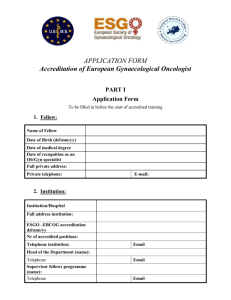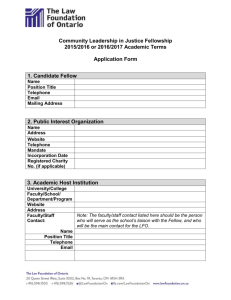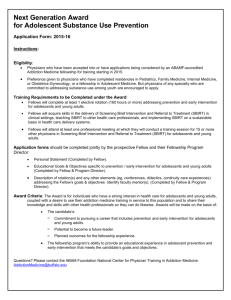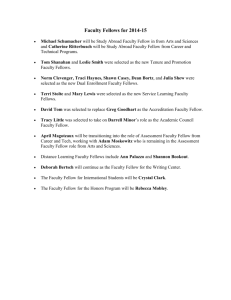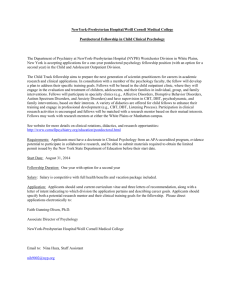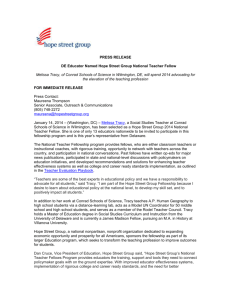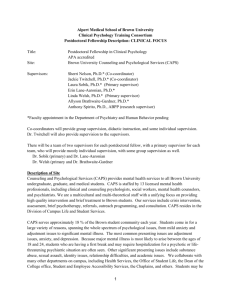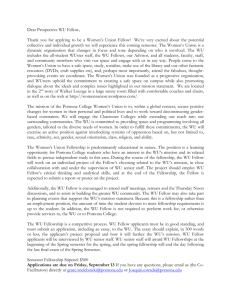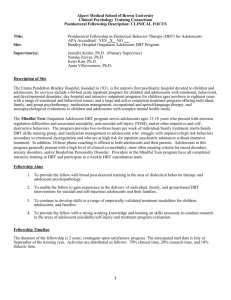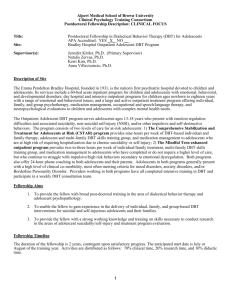Clinical Activity Plan
advertisement
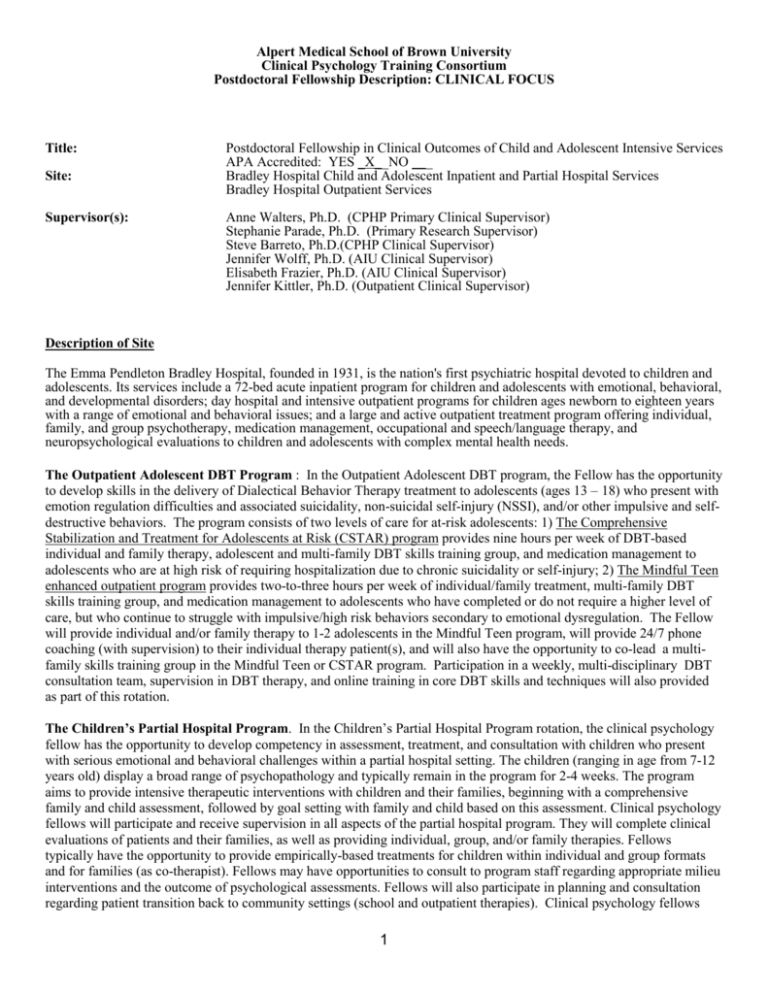
Alpert Medical School of Brown University Clinical Psychology Training Consortium Postdoctoral Fellowship Description: CLINICAL FOCUS Title: Site: Supervisor(s): Postdoctoral Fellowship in Clinical Outcomes of Child and Adolescent Intensive Services APA Accredited: YES _X__NO ___ Bradley Hospital Child and Adolescent Inpatient and Partial Hospital Services Bradley Hospital Outpatient Services Anne Walters, Ph.D. (CPHP Primary Clinical Supervisor) Stephanie Parade, Ph.D. (Primary Research Supervisor) Steve Barreto, Ph.D.(CPHP Clinical Supervisor) Jennifer Wolff, Ph.D. (AIU Clinical Supervisor) Elisabeth Frazier, Ph.D. (AIU Clinical Supervisor) Jennifer Kittler, Ph.D. (Outpatient Clinical Supervisor) Description of Site The Emma Pendleton Bradley Hospital, founded in 1931, is the nation's first psychiatric hospital devoted to children and adolescents. Its services include a 72-bed acute inpatient program for children and adolescents with emotional, behavioral, and developmental disorders; day hospital and intensive outpatient programs for children ages newborn to eighteen years with a range of emotional and behavioral issues; and a large and active outpatient treatment program offering individual, family, and group psychotherapy, medication management, occupational and speech/language therapy, and neuropsychological evaluations to children and adolescents with complex mental health needs. The Outpatient Adolescent DBT Program : In the Outpatient Adolescent DBT program, the Fellow has the opportunity to develop skills in the delivery of Dialectical Behavior Therapy treatment to adolescents (ages 13 – 18) who present with emotion regulation difficulties and associated suicidality, non-suicidal self-injury (NSSI), and/or other impulsive and selfdestructive behaviors. The program consists of two levels of care for at-risk adolescents: 1) The Comprehensive Stabilization and Treatment for Adolescents at Risk (CSTAR) program provides nine hours per week of DBT-based individual and family therapy, adolescent and multi-family DBT skills training group, and medication management to adolescents who are at high risk of requiring hospitalization due to chronic suicidality or self-injury; 2) The Mindful Teen enhanced outpatient program provides two-to-three hours per week of individual/family treatment, multi-family DBT skills training group, and medication management to adolescents who have completed or do not require a higher level of care, but who continue to struggle with impulsive/high risk behaviors secondary to emotional dysregulation. The Fellow will provide individual and/or family therapy to 1-2 adolescents in the Mindful Teen program, will provide 24/7 phone coaching (with supervision) to their individual therapy patient(s), and will also have the opportunity to co-lead a multifamily skills training group in the Mindful Teen or CSTAR program. Participation in a weekly, multi-disciplinary DBT consultation team, supervision in DBT therapy, and online training in core DBT skills and techniques will also provided as part of this rotation. The Children’s Partial Hospital Program. In the Children’s Partial Hospital Program rotation, the clinical psychology fellow has the opportunity to develop competency in assessment, treatment, and consultation with children who present with serious emotional and behavioral challenges within a partial hospital setting. The children (ranging in age from 7-12 years old) display a broad range of psychopathology and typically remain in the program for 2-4 weeks. The program aims to provide intensive therapeutic interventions with children and their families, beginning with a comprehensive family and child assessment, followed by goal setting with family and child based on this assessment. Clinical psychology fellows will participate and receive supervision in all aspects of the partial hospital program. They will complete clinical evaluations of patients and their families, as well as providing individual, group, and/or family therapies. Fellows typically have the opportunity to provide empirically-based treatments for children within individual and group formats and for families (as co-therapist). Fellows may have opportunities to consult to program staff regarding appropriate milieu interventions and the outcome of psychological assessments. Fellows will also participate in planning and consultation regarding patient transition back to community settings (school and outpatient therapies). Clinical psychology fellows 1 Alpert Medical School of Brown University Clinical Psychology Training Consortium Postdoctoral Fellowship Description: CLINICAL FOCUS gain experience working collaboratively with a multidisciplinary treatment team that includes milieu therapists, nurses, teachers, psychologists, social workers, and psychiatrists. The Adolescent Inpatient Unit (AIU). On the AIU, trainees have opportunities to assess and treat teens who present for acute services. Adolescents typically present with primary depression, mood instability, or PTSD with a range of cooccurring issues including suicidality, non-suicidal self-injury, substance use, anxiety, and disruptive behavior problems. The average length of stay is 5-7 days, while some adolescents may experience longer hospitalizations. Fellows are responsible for conducting an initial diagnostic assessment and functional analysis. The initial assessment is then used to develop a case conceptualization and inform the selection of specific CBT and/or DBT skills to deliver in short-term individualized treatment on the AIU. Fellows will also have opportunities to conduct evidence-based skills groups on the unit as well as supervise practicum students and milieu staff who conduct individual skills training. Co-therapy with supervisors also occurs periodically. Residents will attend morning rounds and case conferences. Supervision includes didactics, review of videotaped sessions, discussion of empirical articles, and treatment planning. Fellows maintain a caseload of 5-6 patients that are seen during the 1-2 week stay on the AIU. Fellowship Aims 1. To provide the fellow with broad post-doctoral training in the area of assessing and treating severe psychiatric illness in childhood and adolescence across levels of care. 2. To enable the fellow to gain experience in the delivery of individual, family, and group evidence -based interventions for children, adolescents and their families. 3. To provide the fellow with a strong working knowledge and training on skills necessary to conduct research in the areas of clinical outcomes and treatment program evaluation. Fellowship Timeline The duration of the fellowship is 2 years, contingent upon satisfactory progress. The anticipated start date is July or August of the training year. Activities are distributed as follows: 70% clinical time, 20% research time, and 10% didactic time. Scheduling for position will involve rotating through varied clinical service units, as well as rotations that are dedicated to completion of a research project. The proposed breakdown is 8 hours a week in outpatient services across the two year fellowship, 4 hours a week for didactic activities (grand rounds, post doc seminar, Friday research seminars) across the two year fellowship. 24 hours a week devoted to rotations on Children’s Partial Hospital (10 months), Adolescent In-patient (10 months), during which time the fellow also has 4 hours of research release time , and research/writing mentorship (4 months, during which time 28 hours a week is devoted to research). The timeline for the research writing mentorship is one month at the beginning of the fellowship, 6 weeks in between the two ten month clinical rotations, and 6 weeks at the end of the fellowship. Clinical Activity Plan 70% of the Fellow’s time will be devoted to clinical activities in above described service areas. In order to ensure that the fellow receives a high level of clinical training in the area of assessment and treatment, the following activities will be required during the fellowship: ▪ Treatment services: The Fellow will conduct evidence-based individual, group, and family therapy. The fellow will also supervise the provision of skills based groups for patients. ▪ During clinical rotations, 22-24 hours of the Fellow’s time/effort will be devoted to the provision of treatment services. If assessment services are provided during the clinical rotations, 22 hours will be devoted to therapy provision. a. Individual psychotherapy (6-8 hours/week) b. Family psychotherapy (4 hours/week) c. Group-based psychotherapy (2 hours/week) 2 Alpert Medical School of Brown University Clinical Psychology Training Consortium Postdoctoral Fellowship Description: CLINICAL FOCUS ▪ Clinical assessment: The Fellow will conduct clinical and diagnostic evaluations of children and adolescents as part of the program’s intake process. 2 hours/week can be devoted to clinical and diagnostic evaluations. ▪ Clinical administration: The Fellow will participate in rounds, staff meetings, teams, and will be actively involved in treatment planning and program development activities in addition to completing all required documentation and clinical administrative duties. 8 hours/week will be devoted to team and to clinical administration and program development activities. ▪ Licensure: The Fellow will apply for licensure as a Psychologist in the State of Rhode Island. Research Activity Plan 20% of the Fellow’s time will be spent on research activities focused on clinical outcomes measurement across several levels of care: inpatient, partial, and outpatient. The Fellow will be exposed to various aspects of clinical research work in this area through participation in the following activities: ▪ Review of relevant literature, refining data collection process, Manuscript preparation and submission: The fellow will be encouraged to collaborate on manuscript preparation and poster submissions at national conferences. Individually tailored goals will be established in this area. ▪ Study coordination: The Fellow will develop a research proposal and complete a project in an area of interest within the broad area of clinical outcomes and evaluation of treatment effectiveness. Ideally this will be completed using new EHR system, REDCap, and previously chosen assessment measures available within these systems to assess outcomes across the three levels of care. Didactics 10% time (4 hours/week) is available for supervision and mandatory didactics. If the optional didactic (Academic Friday) is chosen, this time will come out of the 20% research time. Supervision: The Fellow will receive one hour per week of individual supervision with supervising psychologists on treatment services, and one hour a week for individual supervision with supervising psychologist on research. Postdoctoral Seminars: The fellow will participate in post-doctoral seminars through the Brown Postdoctoral Training Program. Mandatory Didactics: Core Seminar Series (1 per month); DPHB Academic Grand Rounds (2 per month); Clinical Ethics Seminar Series (1 per month); and Child Track Seminar Series (1 per month). Optional Didactics: Academic Friday–Grantsmanship, Special Topics in Statistic and Alcohol Center Seminars. In addition, there may be options for the fellow to provide clinical supervision for clinical psychology practicum students when they are assigned to the clinical service with the fellow. Supervision and Evaluation Supervision will be provided in the form of weekly individual clinical supervision with licensed psychologists on site (Drs. Walters, Barreto, Wolff, Frazier, and Kittler ) and individual/group research supervision (Dr. Parade ). Dr. Walters serves as the primary clinical supervisor for the fellowship, and Dr. Parade as the primary research supervisor. At every 6 months for the duration of the fellowship, the fellow and the supervisors will provide formal evaluations, and evaluations of the program relative to the goals and learning objectives of the fellowship. 3 Alpert Medical School of Brown University Clinical Psychology Training Consortium Postdoctoral Fellowship Description: CLINICAL FOCUS Resource Requirements Fellow will be provided with the following resources: ▪ ▪ ▪ ▪ ▪ Access to space appropriate for clinical care A computer and project specific software Internet access Telephone For APA-accredited postdoctoral fellows (only): Shared office space for personal use for clinical and research activities. Path toward licensure: YES__X___ NO_____ The fellow will receive clinical hours toward licensing through both the clinical activity plan as well as clinical research activities (structured clinical assessment of adolescents enrolled in DBT treatment). Reporting and approval This fellowship will be part of the Child track. The position has been discussed and approved by the Child track faculty in their monthly meeting of xxx. _____________________________________ Child Track Post-Doctoral Training Coordinator ______________________________________ Associate Director of Investigator-Funded/APA Approved Fellowships ______________________________________ Director of Psychology Training Consortium 4

